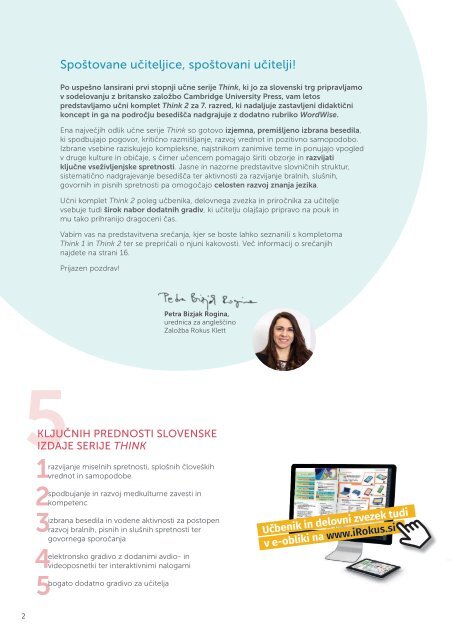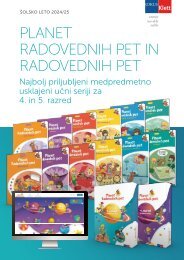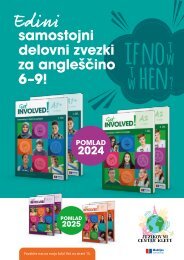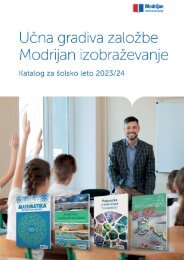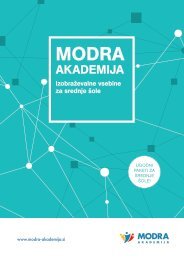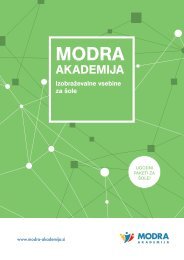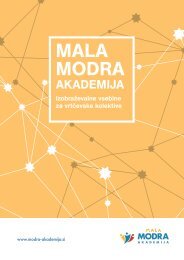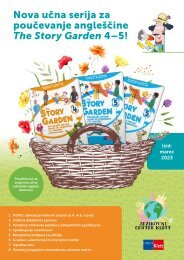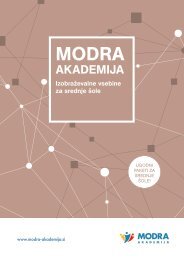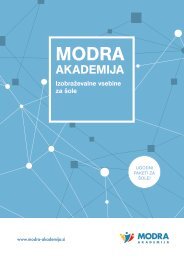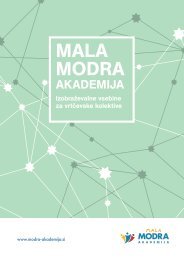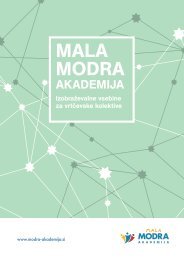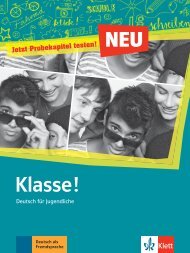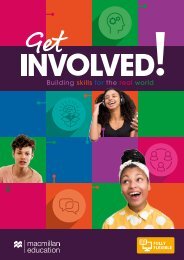Think
Create successful ePaper yourself
Turn your PDF publications into a flip-book with our unique Google optimized e-Paper software.
✃<br />
✃<br />
Spoštovane učiteljice, spoštovani učitelji!<br />
Učna serija <strong>Think</strong><br />
za angleščino v razredih 6–9<br />
Po uspešno lansirani prvi stopnji učne serije <strong>Think</strong>, ki jo za slovenski trg pripravljamo<br />
v sodelovanju z britansko založbo Cambridge University Press, vam letos<br />
predstavljamo učni komplet <strong>Think</strong> 2 za 7. razred, ki nadaljuje zastavljeni didaktični<br />
koncept in ga na področju besedišča nadgrajuje z dodatno rubriko WordWise.<br />
6. RAZRED<br />
7. RAZRED 8. RAZRED 9. RAZRED<br />
Ena največjih odlik učne serije <strong>Think</strong> so gotovo izjemna, premišljeno izbrana besedila,<br />
ki spodbujajo pogovor, kritično razmišljanje, razvoj vrednot in pozitivno samopodobo.<br />
Izbrane vsebine raziskujejo kompleksne, najstnikom zanimive teme in ponujajo vpogled<br />
v druge kulture in običaje, s čimer učencem pomagajo širiti obzorje in razvijati<br />
ključne vseživljenjske spretnosti. Jasne in nazorne predstavitve slovničnih struktur,<br />
sistematično nadgrajevanje besedišča ter aktivnosti za razvijanje bralnih, slušnih,<br />
govornih in pisnih spretnosti pa omogočajo celosten razvoj znanja jezika.<br />
Učni komplet <strong>Think</strong> 2 poleg učbenika, delovnega zvezka in priročnika za učitelje<br />
vsebuje tudi širok nabor dodatnih gradiv, ki učitelju olajšajo pripravo na pouk in<br />
mu tako prihranijo dragoceni čas.<br />
Vabim vas na predstavitvena srečanja, kjer se boste lahko seznanili s kompletoma<br />
<strong>Think</strong> 1 in <strong>Think</strong> 2 ter se prepričali o njuni kakovosti. Več informacij o srečanjih<br />
najdete na strani 16.<br />
Prijazen pozdrav!<br />
Petra Bizjak Rogina,<br />
urednica za angleščino<br />
Založba Rokus Klett<br />
UČBENIK<br />
z dostopom do e-oblike<br />
DELOVNI ZVEZEK<br />
z dostopom do e-oblike<br />
Učbenik<br />
<strong>Think</strong> 1<br />
ŽE NA<br />
VOLJO<br />
ŽE NA<br />
VOLJO<br />
Učbenik<br />
<strong>Think</strong> 2<br />
POMLAD<br />
2020<br />
POMLAD<br />
2020<br />
Učbenik<br />
<strong>Think</strong> 3<br />
NA VOLJO<br />
2021 NA VOLJO<br />
2022<br />
NA VOLJO<br />
Učbenik<br />
<strong>Think</strong> 4<br />
2021 NA VOLJO<br />
2022<br />
Delovni zvezek<br />
<strong>Think</strong> 1<br />
Delovni zvezek<br />
<strong>Think</strong> 2<br />
Delovni zvezek<br />
<strong>Think</strong> 3<br />
Delovni zvezek<br />
<strong>Think</strong> 4<br />
5KLJUČNIH PREDNOSTI SLOVENSKE<br />
IZDAJE SERIJE THINK<br />
1<br />
2<br />
3<br />
4<br />
5<br />
razvijanje miselnih spretnosti, splošnih človeških<br />
vrednot in samopodobe<br />
spodbujanje in razvoj medkulturne zavesti in<br />
kompetenc<br />
izbrana besedila in vodene aktivnosti za postopen<br />
razvoj bralnih, pisnih in slušnih spretnosti ter<br />
govornega sporočanja<br />
elektronsko gradivo z dodanimi avdio- in<br />
videoposnetki ter interaktivnimi nalogami<br />
bogato dodatno gradivo za učitelja<br />
Učbenik in delovni zvezek tudi<br />
v e-obliki na www.iRokus.si<br />
Dodatno gradivo za učitelja<br />
Na spletni strani www.devetletka.net bodo<br />
od avgusta 2020 brezplačno na voljo:<br />
• priročnik za učitelja<br />
• predlog letnega delovnega načrta<br />
• predlog učnih priprav<br />
• dodatne vaje za slovnico s tristopenjsko<br />
diferenciacijo<br />
• dodatne vaje za besedišče s tristopenjsko diferenciacijo<br />
• delovni listi (za komunikacijo, razvijanje<br />
socialnih veščin in podporo video vsebinam)<br />
• testi za preverjanje slovnice, besedišča<br />
in vseh štirih jezikovnih spretnosti<br />
• predstavitve izbranih slovničnih struktur<br />
Name Class Date<br />
1 VOCABULARY<br />
1 Match the words to make phrases.<br />
0. play a. a pet<br />
1. take b. a blog<br />
2. keep c. in a club<br />
3. play d. tennis<br />
4. write e. autographs<br />
5. collect f. photos<br />
6. be g. an instrument<br />
7. do h. crosswords<br />
2 Choose the correct words.<br />
0. Do you write / play the piano?<br />
1. Do you collect / take autographs?<br />
2. I play / write a blog about my school.<br />
3. I wan to be / join in the swimming club.<br />
4. Do you make / take photos?<br />
5. They don’t do / play crosswords.<br />
6. Do you take / play computer games?<br />
7. Sam and Tina keep / co lect a pet.<br />
3 Match the sentence halves.<br />
0. I have a shower _e<br />
1. A the weekend, I __<br />
2. Do you like __<br />
3. When I have a problem, __<br />
4. In the summer I have __<br />
5. Do you have a __<br />
6. Tom wants to be __<br />
7. Does Fiona have __<br />
a. have fun!<br />
b. a famous violin player.<br />
c. a rest after lunch.<br />
d. dinner with her parents?<br />
e. before breakfast.<br />
f. I speak to my teacher.<br />
g. good time a the weekend?<br />
h. puzzles and crosswords?<br />
<strong>Think</strong> Level 1 Unit 1 Vocabulary<br />
Name Class Date<br />
COMMUNICATION<br />
Unit 1: Having fun<br />
Student A<br />
4 Pu the words in order to complete the sentences.<br />
0. are / having / just / dinner<br />
We are just having dinner.<br />
1. rest / having / a / is<br />
Joe____________________________<br />
2. problem / I / a / think / have<br />
I _____________________________<br />
3. having / fun / is<br />
Alice___________________________<br />
4. time / a / you / good / having<br />
Are___________________________?<br />
5. a / footba l game / shower / after / have / a<br />
I _____________________________<br />
1 Answer the questions so they are true about you.<br />
Example:<br />
What do you always do on Saturday?<br />
I always meet my friends on Saturday.<br />
1 What do you often do after school?<br />
2 What do you usua ly do in the evening?<br />
5 Complete the sentences with the words in the list.<br />
There are three extra words.<br />
3 What do you never do in the morning?<br />
4 How often do you drink coffee?<br />
look | push | on | up | that’s | cool | hurry | careful | do<br />
5 How often do you go to the cinema?<br />
6 How often do you take photos?<br />
7 How often do you tidy you room?<br />
8 How often do you play an instrument?<br />
2 Work in pairs. Ask and answer about your<br />
sentences in Exercise 1.<br />
Example:<br />
A: What do you always do on Saturday?<br />
B: I always go swimming on Saturday.<br />
Th i n kLevel 1 Unit 1 Communication<br />
0. A: Do you like my shirt?<br />
B: Yes, it’s cool.<br />
1. Hey Sam. What are you ________ to?<br />
2. _________ out! There’s a car coming.<br />
3. _______ up! The train leaves in 5 minutes.<br />
4. A: Is Tina twelve years old?<br />
B: Yes, __________ right.<br />
5. Come ________ guys. We have to star the<br />
game now!<br />
3 Te l the class about your sentences and your<br />
6 Complete the classroom language with the words<br />
in the list.<br />
partner’s sentences. Are they the same or<br />
d i ff e r e n t ?<br />
Example:<br />
excuse | up | open | spe l | ask | know | say | mean<br />
I often do my homework after school. Sofia never does<br />
her homework after school.<br />
Name Class Date<br />
1 GRAMMAR<br />
1 Choose the correct option.<br />
0. I like / likes dogs.<br />
1. Robert live / lives near the park.<br />
2. They listen / listens to a lot of music.<br />
3. Jane take / takes photos of her friends.<br />
4. My best friend collect / collects stamps.<br />
5. Sports cars go / goes very fast.<br />
6. My sisters run / runs every afternoon.<br />
0. How do you say ‘car’ in French?<br />
1. What does ‘boiled’ _________?<br />
2. A: How do you ___________ that?<br />
B: It’s T–O–W–N.<br />
3. Put your hand _________ if you know<br />
the answer.<br />
4. Can I ____________ a question?<br />
5. ___________ me. Can you help me?<br />
6. ___________ your books at page 15.<br />
7. Sorry, I don’t ____ the answer.<br />
Unit 1: Having fun<br />
Student B<br />
PHOTOCOPIABLE © Cambridge University Press 2017<br />
1 Answer the questions so they are true about you.<br />
Example:<br />
How often do you tidy you room?<br />
I always tidy my room.<br />
2 Complete the sentences with do, does, don’t or<br />
doesn’t.<br />
1 What do you always do on Saturday?<br />
2 What do you often do after school?<br />
3 What do you usually do in the evening?<br />
0. He doesn’t eat spinach.<br />
1. My friends ______ read the newspaper.<br />
2. ______ you play the piano?<br />
3. I ______ enjoy doing homework.<br />
4. _____ Mary write a blog?<br />
5. ______ it often rain here?<br />
4 What do you never do in the morning?<br />
5 How often do you drink coffee?<br />
6 How often do you go to the cinema?<br />
7 How often do you take photos?<br />
8 How often do you play an instrument?<br />
2 Work in pairs. Ask and answer about your<br />
sentences in Exercise 1.<br />
3 Match the questions and answers.<br />
0. Does Mary have any brothers? g<br />
1. Do you like chocolate? ___<br />
2. Does Henry collect toys? ___<br />
3. Do your parents enjoy pop music? ___<br />
4. Do we have homework for tomorrow? ___<br />
5. Do you love reading? ___<br />
6. Do your grandparents live with you? ___<br />
Example:<br />
A: What do you often do after school?<br />
B: I often watch TV after school.<br />
3 Te l the class about your sentences and your<br />
partner’s sentences. Are they the same or<br />
d i ff e r e n t ?<br />
Example:<br />
<strong>Think</strong> Level 1 Unit 1 Grammar<br />
I never do my homework after school. Paula often does<br />
her homework after school.<br />
a. No, he prefers coins.<br />
b. No, we don’t.<br />
c. No, I don’t.<br />
d. Yes, I love it. My favourite book is Dracula.<br />
e. No, they don’t. They live in another city.<br />
f. No, they prefer opera.<br />
g. Yes, she has two.<br />
PHOTOCOPIABLE<br />
Name Class Date<br />
COMMUNICATION<br />
Unit 1: Having fun<br />
Student A<br />
© Cambridge University Press 2018<br />
Th i n kLevel 1 Unit 1 Communication<br />
4 Use the words to make sentences.<br />
0. George / like / jazz music (+)<br />
George likes jazz music.<br />
1. She / watch / TV after school (+)<br />
____________________________<br />
2. I / wash / my car every day (-)<br />
____________________________<br />
3. We / make / pizza on Fridays (+)<br />
____________________________<br />
4. Alicia / walk / to school (-)<br />
____________________________<br />
5. Fran’s sister / play / football (-)<br />
____________________________<br />
6. My dog / sleep / a lot (+)<br />
____________________________<br />
1 Answer the questions so they are true about you.<br />
Example:<br />
What do you always do on Saturday?<br />
I always meet my friends on Saturday.<br />
1 What do you often do after school?<br />
2 What do you usua ly do in the evening?<br />
3 What do you never do in the morning?<br />
4 How often do you drink coffee?<br />
5 How often do you go to the cinema?<br />
5 Correct the mistakes.<br />
0. I can’t stand to read the newspaper.<br />
I can’t stand reading the newspaper.<br />
1. I eat always lunch at 14:00.<br />
_____________________________<br />
2. Karen doesnt mind working late.<br />
_____________________________<br />
3. We nevers study in the evening.<br />
_____________________________<br />
4. Does your mother likes cooking?<br />
_____________________________<br />
5. Douglas eats out one time a week.<br />
_____________________________<br />
6. Do you take the bus often to school?<br />
_____________________________<br />
6 How often do you take photos?<br />
7 How often do you tidy you room?<br />
8 How often do you play an instrument?<br />
2 Work in pairs. Ask and answer about your<br />
sentences in Exercise 1.<br />
Example:<br />
A: What do you always do on Saturday?<br />
B: I always go swimming on Saturday.<br />
3 Te l the class about your sentences and your<br />
partner’s sentences. Are they the same or<br />
d i ff e r e n t ?<br />
Example:<br />
I often do my homework after school. Sofia never does<br />
her homework after school.<br />
6 Complete the e-mail with words in the list.<br />
have | sometimes | don’t | do | can’t | hate<br />
studying | love<br />
Hello. My name is Henry and I am 14 years old. I<br />
0 have one brother but I 1 _______ have any sisters.<br />
My brother plays football. I love 2 _______ History<br />
and English because they are my favourite subjects. I<br />
3 _______ go to the mall with my friends and I<br />
4 _______ going to the cinema. What 5 _______ you<br />
like doing in your free time?<br />
Write soon, Pablo<br />
PHOTOCOPIABLE © Cambridge University Press 2017<br />
Unit 1: Having fun<br />
Student B<br />
1 Answer the questions so they are true about you.<br />
Example:<br />
How often do you tidy you room?<br />
I always tidy my room.<br />
1 What do you always do on Saturday?<br />
2 What do you often do after school?<br />
3 What do you usua ly do in the evening?<br />
4 What do you never do in the morning?<br />
5 How often do you drink coffee?<br />
6 How often do you go to the cinema?<br />
7 How often do you take photos?<br />
8 How often do you play an instrument?<br />
2 Work in pairs. Ask and answer about your<br />
sentences in Exercise 1.<br />
Example:<br />
A: What do you often do after school?<br />
B: I often watch TV after school.<br />
3 Te l the class about your sentences and your<br />
partner’s sentences. Are they the same or<br />
d i ff e r e n t ?<br />
Example:<br />
I never do my homework after school. Paula often does<br />
her homework after school.<br />
PHOTOCOPIABLE<br />
© Cambridge University Press 2018<br />
Več na straneh 12 in 13 →<br />
26<br />
1 FUN<br />
Objectives<br />
FUNCTIONS talking about routines and everyday activities;<br />
expressing likes and dislikes; giving warnings<br />
and stating prohibition<br />
GRAMMAR present simple review; like + -ing; adverbs of<br />
frequency<br />
VOCABULARY hobbies; co locations with have<br />
Student’s Book page 12–13<br />
READING<br />
1 If there is an interactive whiteboard (IWB) available<br />
in the classroom, the picture description would<br />
best be done as a heads-up activity with the whole<br />
class. Say sleeping, and nominate a strong student to<br />
point to the correct picture on the board. The rest<br />
of the class check and confirm or reject answers.<br />
There may be some pictures that students disagree<br />
about. Remind them that each word should only be<br />
used once, so they should try and work out the best<br />
answer through elimination. Alternatively, students<br />
do the matching activity in pairs before checking<br />
answers with the whole class. Again, ask the rest of<br />
the class to check and confirm or reject answers.<br />
Answers<br />
1 C 2 G 3 H 4 B 5 A 6 E 7 F 8 D<br />
Optional extension<br />
Students work in pairs to test each other about the activities.<br />
They look at the photos, cover the exercises and take turns<br />
to point to a photo at random and ask: What’s this? Monitor<br />
the activity, and conclude things when most pairs have gone<br />
through all the images.<br />
2 Check comprehension of fun by asking students<br />
to name activities they consider fun. Also check if<br />
students understand the difference between always,<br />
sometimes and never. Draw a line with 0% at one end<br />
and 100% at the other end on the board, and ask<br />
students to situate each adverb at the appropriate<br />
place on the line. Then students go through the list<br />
and complete the statements. Ask for a show of hands<br />
to find out which activities students find the most fun<br />
(they could raise both hands for always and one hand<br />
for sometimes).<br />
3 SPEAKING Give groups two minutes or so to<br />
compare their ideas.<br />
HAVING<br />
4 SPEAKING Do the activity as a contest between<br />
groups: which group will be the first to come up<br />
with at least ten activities? Ask the winning group<br />
to tell the class their ten activities and write any<br />
new phrases on the board. The other students should<br />
cross off all the words they also have on their lists as<br />
they hear them, and tell you any other words they<br />
have thought of to be added to list on the board.<br />
Then give the groups a couple of minutes to discuss<br />
which activities they think are and aren’t fun. They<br />
have to try to find activities that they agree about.<br />
Monitor and check the use of the new vocabulary.<br />
Ask a student from each group to report back on<br />
activities they all agreed on, and activities that<br />
caused disagreement. How many activities do all the<br />
students in the class agree on?<br />
5 1.17 Ask students to cover up the text on page<br />
13 and look at the title only, or display the page<br />
on the IWB if you use one, and zoom in to the title.<br />
Ask students what they think the text is about and<br />
write their ideas on the board. Prediction helps<br />
motivate students to read and find out if they’re<br />
right. Check that students understand the meaning<br />
of take (good) care of (to look after) then ask them<br />
to read the introductory paragraph quickly to check<br />
their ideas. Elicit which predictions were correct.<br />
Then ask the class to look at the pictures and elicit<br />
what the person is doing in each case. This is a good<br />
opportunity to teach the words smile, relax, crossword<br />
puzzle and hobby if students don’t already know them.<br />
Play the audio for students to listen, read and match<br />
the pictures with the questions. Students compare<br />
answers in pairs before you check with the whole<br />
class.<br />
Answers<br />
A 2 B 5 C 3 D 1 E 6 F 4 G 7<br />
Taking care of yourself<br />
1 Ask the class: Why is it important to take care of<br />
yourself? Elicit some simple ideas in response, such<br />
as: because it’s important to be healthy; you can’t<br />
enjoy life if you aren’t healthy, etc. Then give<br />
students a minute to go through the list and match<br />
the questions with the items in the list.<br />
2 3


